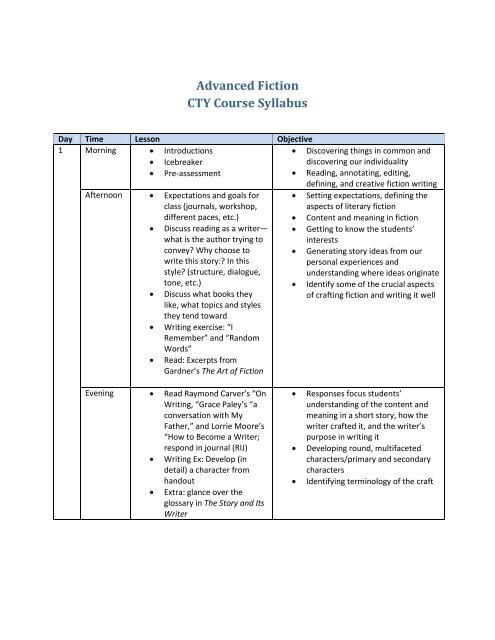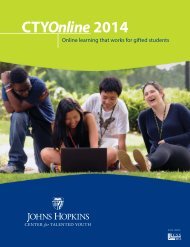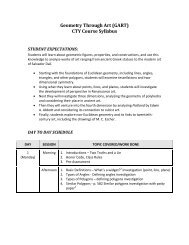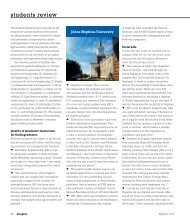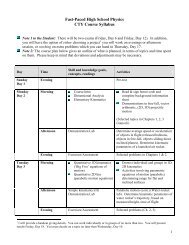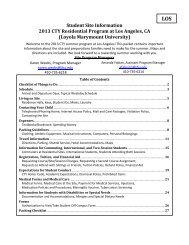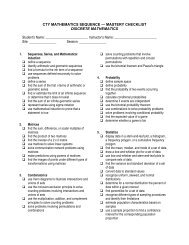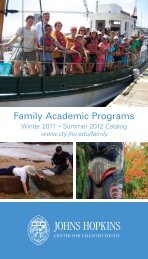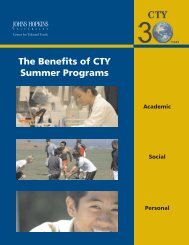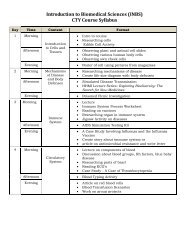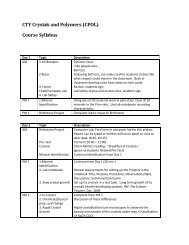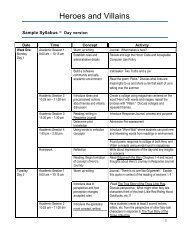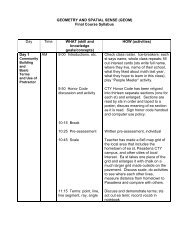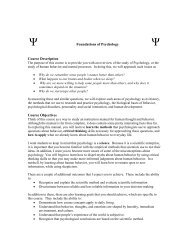Sample syllabus 2
Sample syllabus 2
Sample syllabus 2
You also want an ePaper? Increase the reach of your titles
YUMPU automatically turns print PDFs into web optimized ePapers that Google loves.
Advanced FictionCTY Course SyllabusDay Time Lesson Objective1 Morning • Introductions• Discovering things in common and• Icebreakerdiscovering our individuality• Pre-assessment• Reading, annotating, editing,1 Afternoon • Expectations and goals forclass (journals, workshop,different paces, etc.)• Discuss reading as a writer—what is the author trying toconvey? Why choose towrite this story:? In thisstyle? (structure, dialogue,tone, etc.)• Discuss what books theylike, what topics and stylesthey tend toward• Writing exercise: “IRemember” and “RandomWords”• Read: Excerpts fromGardner’s The Art of Fictiondefining, and creative fiction writing• Setting expectations, defining theaspects of literary fiction• Content and meaning in fiction• Getting to know the students’interests• Generating story ideas from ourpersonal experiences andunderstanding where ideas originate• Identify some of the crucial aspectsof crafting fiction and writing it well1 Evening • Read Raymond Carver’s “OnWriting, “Grace Paley’s “aconversation with MyFather,” and Lorrie Moore’s“How to Become a Writer;respond in journal (RIJ)• Writing Ex: Develop (indetail) a character fromhandout• Extra: glance over theglossary in The Story and ItsWriter• Responses focus students’understanding of the content andmeaning in a short story, how thewriter crafted it, and the writer’spurpose in writing it• Developing round, multifacetedcharacters/primary and secondarycharacters• Identifying terminology of the craft
Day Time Lesson Objective2 Morning • Discuss Carver, Paley, andMoore• Critical Analysis: Reading writingabout writing, deconstructing a• Activity: Brainstorm on theboard common clichés andcliché storylinesstory, and understanding thewriter’s objective• Discuss taboo subjects andcliché: Moore’s use of iteffectively2 Afternoon • Read Raymond Caver’s“What We Talk About WhenWe Talk About Love” andGeorge Saunders’ “The Falls”(RIJ)• Writing Ex: “The well-chosenmodifier” – write a storywith no adjectives oradverbs (10-15 minutes)2 Evening • Read Bird by Bird excerpts(RIJ)3 Morning • Field Trip: TownCoffeehouse• Writing Ex: “Finding Fiction”and “Sparkwords”3 Afternoon • Discuss Carver and Saunders• Read Anne Lamott for ideas• Conference with instructor;write on exercises/ideas3 Evening • Read Kafka’s “A HungerArtist” and Ozick’s “TheShawl” (RIJ)• Writing Ex: ThroughDifferent Eyes4 Morning • Discuss Kafka and Ozick(setting and mood)• Writing Ex: Character andSetting/Story #1 Writing• The power of simplicity:understanding how additives can beunnecessary and too easy, a laCarver• Consider writing process, ownexperiences with writing• Brainstorm and generate storyideas• Understanding Subtext• Effective use of dialogue• Direct vs Indirect Discourse• Understanding perspective andpoint of view• Setting and mood• Cadence and tone4 Afternoon • Writing Lab: Story #1• continued with instructorguidance
Day Time Lesson Objective4 Evening • Writing Lab: Story #1continued with instructorguidance; informalworkshopping5 All day • Writing Lab: Story #16 Morning • Finish Story #1 if needed orBrainstorming/WritingExercises/RecommendedReading from the Text forStory#2• Read and Discuss TobiasWolff’s Bullet to the Brain”and Ernest Hemingway’s“The Killers”6 Afternoon • Read Rick Moody’s “Boys” &Kincaid’s “Girl” (RIJ)• Writing Ex: Write from theopposite gender or in one ofthe specific styles studied inthe or session• Using fiction to inspire fiction• The Tip of the Iceberg:Understanding how what’s left“unsaid” in a story can inform thereader/Interpretation and Inference• Stream of Consciousness Generatingideas for story #26 Evening • Read & Critique,/Respond toStories 1-37 Morning • Workshop Stories 1-37 Afternoon• Writing Lab: Story #27 Evening • Read & Critique/Respond toStories 4-68 Morning • Workshop Stories 4-68 Afternoon • Writing Lab: Story #2 cont8 Evening • Read & Critique/Respond toStories 7-11
Day Time Lesson Objective9 Morning • Workshop Stories 7-109 Afternoon • Writing Lab: Story #2 cont9 Evening • – Film: Finding Forrester • “The Rules” and how to break them• “Just Write!”10 Morning • Finish Film• Mini Workshops on Story #2• Instructor Conferencing10 Afternoon • Writing Lab: Story #2 cont10 Evening • Writing Lab: Story #211 Morning • Read & Critique DenisJohnson’s Emergency,”Junot Diaz’ “”, HarukiMuikami Johnathan SanfanFoer””• Discussion: Story andStructure/Revision andEditing• Writing Exercise: Map theStory scene by scene, thendo your own.• Understanding Structure andidentifying areas for Revision11 Afternoon • Continuation of Exercises11 Evening • Writing Lab: Revision12 Morning • Writing Lab: Revision• Read: Vladimir Nabokov’s“Signs and Symbol’s”12 Afternoon • Writing Exercise andBoardwork (groups): Find allof the signs and symbols inthe story• Then discuss what theymean and Nabokov’sintentions in writing such apiece—“Shchekkotiki!”• Deciphering Metaphor andForeshadowing• Reading for Joy!
Day Time Lesson Objective12 Evening • Game: Balderdash• Instructor Conferencing13 Morning • “You Teach the Class”—Begin TeachingPresentations: Read inGroups and prepare yourstory for discussion.o Margaret Atwood’s“Happy Endings” (How?And Why?)o Gabriel Garcia Marquez’s“The Very Old Man withEnormous Wings”(Thematic Intent)o Diane Shoemperlen’s BodyLanguage,” (Style)o Don DeLillo’s “Videotape”(The Lens)• Students identify how to criticallyanalyze on their own and presenttheir findings as well as facilitatediscussion.13 Afternoon • Writing Lab: Revisions13 Evening • Revisions/Peer Review14 Morning • Discussion: Graphic Storytelling Read: R. Crumb andMarowitz- “A HungerArtist,” Art Spiegelman,Maus,etc . . .• Visual Fiction and ExpandingHorizons14 Afternoon • Finish Revisions and Activity(continued)• Construct Class Anthology14 Evening • Finish any last projects• Discussion of next steps foryoung writers15 All day • Anthology Reading and Q&A


